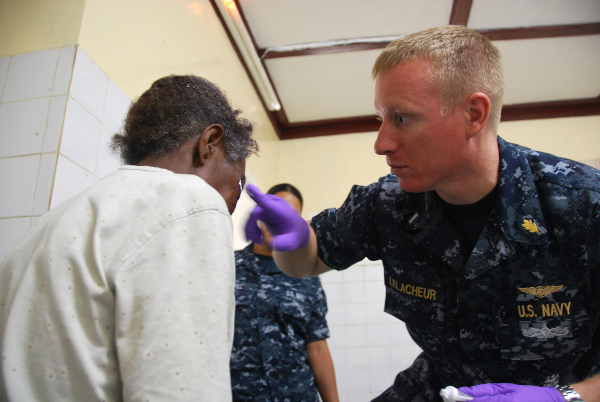A Navy Nurse is critical to many aspects of the military medical health system.
Nurses serve the country by not only helping those in the military, but also their families and other needs across the globe.
As a result, you will serve in some of the most dynamic environments you could ever imagine.
Navy Nurses also receive scholarship opportunities to graduate from nursing school debt-free, which is a huge benefit over their civilian counterparts.
Learn more about what it takes to become a Navy Nurse, as well as a detailed explanation of their job responsibilities.
Related Article – Best Navy Officer Jobs: Consider These Top 10 Military Careers
Jump To A Section
#1. Navy Nurse Requirements
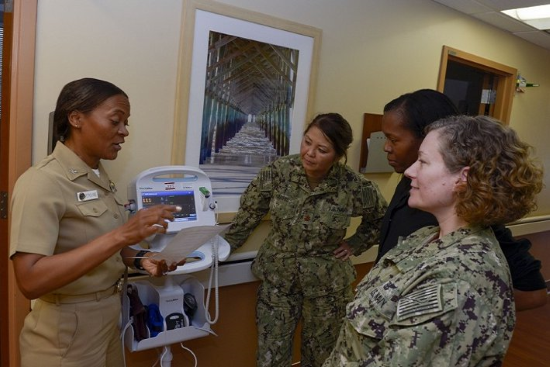
There are many different requirements you need to meet just to even apply for the Navy Nurse Corps.
The U.S. Navy refers to the military job specialty as the Navy Nurse Corps, though there are many sub-specialties under the designation.
Basic Requirements
First, you need to be a citizen of the United States.
Secondly, you either need to be a licensed nurse currently practicing and able to attain 20 years of active commissioned service by age 62.
Or, you can represent a student or graduate in good standing of an approved college that is accredited by the Commission on Collegiate Nursing Education (CCNE).
Those interested in the Navy Nurse Corps need to be licensed to practice in the United States, District of Columbia, Puerto Rico, or a U.S. territory.
The Navy Nurse Corps traditionally accepts new members between the ages of 18 and 41.
There is hope that you can serve a minimum of three years in Active Duty.
Finally, the Navy expects nurses to be in good physical condition and pass a full medical exam.
Education
It takes time and patience to become a nurse in the United States through advanced schooling.
Therefore, before you enlist in the Navy Nurse Corps you need to attend or graduate from an accredited nursing school.
The U.S. Navy currently accepts accreditation from the Commission on Collegiate Nursing Education (CCNE) and the Accreditation Commission for Education in Nursing (ACEN).
Additionally, Nurse Practitioners (NP), Certified Register Nurse Anesthetists (CRNA), and Certified Nurse Midwives (CNM) need an awarded Master’s degree.
Graduates also need to pass the certification examination from a professional specialty organization.
The Navy has different requirements for foreign nursing school graduates that obtain a degree outside the country.
All Navy Nurses are commissioned officers which means you need to have at least a bachelor’s degree.
Any civilian that has earned a minimum of a bachelor’s degree in nursing and received their RN license can apply for direct commission.
Additionally, current students in college may apply for programs that offer financial relief in exchange for a service commitment after completing nursing school.
Thankfully, the U.S. Navy is one of the best military branches for nursing as it can offer a full-ride scholarship available for high school students.
Scholarship money for nursing school is also available to current student nurses through the Nurse Candidate Program.
Related Article – 20 Best Jobs For Veterans With & Without A Degree
Licensing
The Navy Nurse Corps requires prospective candidates to possess a current, unrestricted license that is in good standing.
The licensing confirms that you are allowed to practice as a registered professional nurse from a state, territory, or commonwealth of the United States.
Nursing students earn licensing through the National Council Licensure Examination (NCLEX).
However, applicants may still receive a professional nurse license that is issued by a Board of Nursing that does not require you to complete NCLEX.
It is possible to receive appointment to the Navy Nurse Corps before licensure yet is rare, and only available through the Nurse Corps pipeline baccalaureate program.
#2. Navy Nurse Training
There are multiple ways to prepare for a career as a Navy Nurse.
High school students may prepare to become a Navy Nurse through the Naval Reserve Officer Training Corps (NROTC).
The NROTC offers a Nurse Option scholarship which can cover up to $180,000 of your education.
The financial award amount is enough to cover most, if not all, of your nursing school.
Additionally, there is zero obligation to military training until after the program is completed.
It allows you to focus on your studies before you advance to the Navy Nurse Corps.
Meanwhile, current nursing students should consider the Nurse Candidate Program (NCP).
The initial grant provides $10,000 in scholarship money plus a monthly stipend.
Therefore, you may receive up to $34,000 in financial aid while making it through nursing school.
After completing your degree and receiving the correct licensure, prospective candidates attend Officer Development School (ODC).
Officer Development School takes place in Newport, Rhode Island, and lasts 5 weeks.
The purpose of the program is to introduce you to the responsibilities of Navy Staff Corps Officers.
It also allows you to bypass the traditional Navy Officer Candidate School (OCS) designed to train aspiring officers.
Navy ODS teaches you about military structure, history, culture, customs, and military etiquette.
You also learn valuable leadership skills as you develop your role as a much needed Navy Nurse.
Related Article – Navy A School: A List Of All 24 Locations + Training Summary
#3. What does a Navy Nurse do?
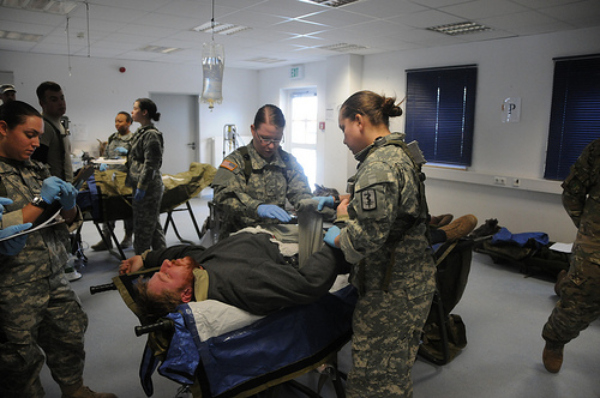
A Navy Nurse is essential to the daily services provided by the military branch.
The Navy Nurse Corps not only provides service and care for sailors, but also their families and other people in need across the globe.
As a result, you will assist a team of talented colleagues working together under a common mission.
A Navy Nurse has the opportunity to educate, lead, and shape policy within Navy Health Care.
The Navy Nurse Corps applies cutting-edge medical advances at world-class hospitals both domestically and throughout the world.
Navy Nurses also utilize some of the most advanced technology on the planet, like Radio Frequency Identification (RFID).
For this reason, you can work at some of the premier military nursing facilities on-shore, as well as at sea.
Navy Nurses handle everything a typical civilian nurse would like checking vitals and treating wounds.
Nurses are also traditionally good with people as they help to lift spirits and restore hope when patients come in suffering or down on their luck.
These professionals collaborate with physicians, surgeons, cardiologists, and other nurses for the best treatment plans available.
As a result, you will transform into a well respected and highly dependable leader within the military medical community.
Related Article – Navy Hospital Corpsman (HM): Everything You Need To Know
Job Description of a Navy Nurse
A Navy Nurse is an Officer in the United States Navy.
You are part of the Navy Nurse Corps which has many different specialties within the department.
Nurses develop strong peer-to-peer relationships with highly trained Navy Physicians.
The experience is invaluable both during your time serving the military and after you leave in the civilian world.
Essential job functions of a Navy Nurse include:
- Educating, leading, and shaping policy within Navy Health Care.
- Instructing Hospital Corpsmen on how to provide quality patient care.
- Applying cutting-edge medical advances at world-class hospitals.
- Utilizing some of the most advanced medical technology on the planet.
- Conducting general nursing duties like checking vitals and treating wounds.
Becoming a Navy Nurse allows you to step out of your comfort zone and become integral during significant events like humanitarian relief or natural disasters.
Navy Nurse Specialties
The Navy Nurse Corps features a wide scope of career opportunities.
Therefore, Navy Nurses may focus on any of the more than dozen sought-after practice areas, including:
- Critical Care
- Education
- Emergency Trauma
- Manpower System Analysis
- Maternal/Infant
- Medical/Surgical
- Midwife Nurse
- Neonatal Intensive Care
- Nurse Anesthetist
- Nurse Practitioner (Family, Pediatric, Psychiatric, or Women’s Health)
- Pediatrics
- Perioperative
- Psychiatric
- Public Health
- Research
- Training Management
The Navy Nurse Corps is a full-time position where you can take full advantage of available career and leadership opportunities.
The one outstanding aspect of the Corps is the promotion opportunities are nearly endless.
Work Environment
A Navy Nurse may work in many different places when part of the Officer Staff Corps.
For example, you may serve in one of the more than 250 Navy and medical facilities around the world.
These include facilities in places like Hawaii and Washington, D.C. along with international locations in Germany and Japan.
The navy also operates three highly acclaimed National Naval Medical Centers in California, Maryland, and Virginia.
Additionally, two hospital ships (USNS Comfort and USNS Mercy) also provide medical facilities abroad a ship.
Navy Nurses may also assist onboard a surface ship, nearby aircraft squadron, or Fleet Marine Force.
Related Article – List Of Navy Bases In The US
#4. How much does a Navy Nurse make?
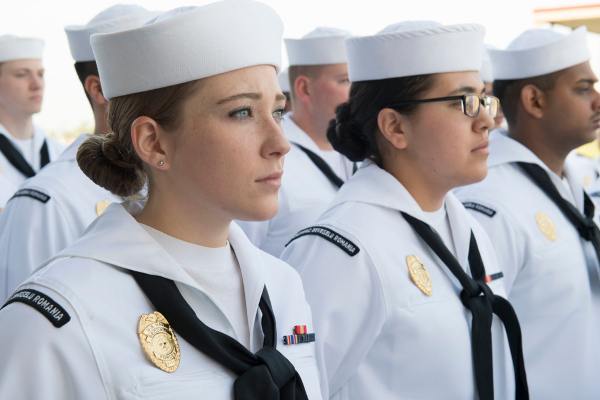
The United States Navy pays sailors based on military rank and years of experience.
Consequently, sailors are not compensated based on their military specialty.
A Navy Nurse is an officer and therefore receives pay in one of the following ranks:
| Insignia | Pay Grade | Rank | Abbreviation | 2023 Minimum Monthly Pay |
|---|---|---|---|---|
| O-1 | Ensign | ENS | $3,637.20 | |
| O-2 | Lieutenant Junior Grade | LTJG | $4,190.70 | |
| O-3 | Lieutenant | LT | $4,849.80 | |
| O-4 | Lieutenant Commander | LCDR | $5,516.40 | |
| O-5 | Commander | CDR | $6,393.30 | |
| O-6 | Captain | CAPT | $7,669.20 | |
| O-7 | Rear Admiral Lower Half | RDML | $10,113.00 | |
| O-8 | Rear Admiral | RADM | $12,170.70 | |
| O-9 | Vice Admiral | VADM | $17,201.40 | |
| O-10 | Admiral | ADM | $17,675.10 |
Keep in mind that one of the major advantages of the Navy Nurse Corps is the ability to have all or part of nursing school covered in grants.
It is possible to get a full-ride scholarship for high school students and up to $34,000 through the Nurse Candidate Program (NCP).
Plus, the United States Navy has a really good benefits package that includes health care, paid time off from work, and housing/food support.
Related Article – Navy Reserve Pay
#5. Job Reviews
There are a plethora of job reviews available on GlassDoor and Indeed from existing members of the Navy Nurse Corps.
Here are some of the highlights:

You can meet a variety of people from all walks of life serving the Navy Nurse Corps:

Nursing in the U.S. Navy is one of the better specialties for advancing your career and constantly seeking out new promotions:

The Navy Nurse Corps offers a ton of benefits including help financing your education and preparing you for a job field in need once you retire from the military:

#6. Civilian Job Opportunities
Becoming a Navy Nurse does wonder for your civilian job opportunities.
The medical field is in extremely high demand with an abundance of baby boomers evolving into seniors, especially with the recent COVID-19 pandemic.
Serving the U.S. Navy as a nurse helps pay for your education and training.
Then, you receive tremendous and unique experience working as a nurse at some of the most sophisticated medical facilities in the world.
The type of experience and training you receive through the U.S. Navy will almost guarantee you a job at a civilian medical facility after leaving the military.
Related Article – 10 Best Navy Jobs For Civilian Life
Frequently Asked Questions (FAQ)
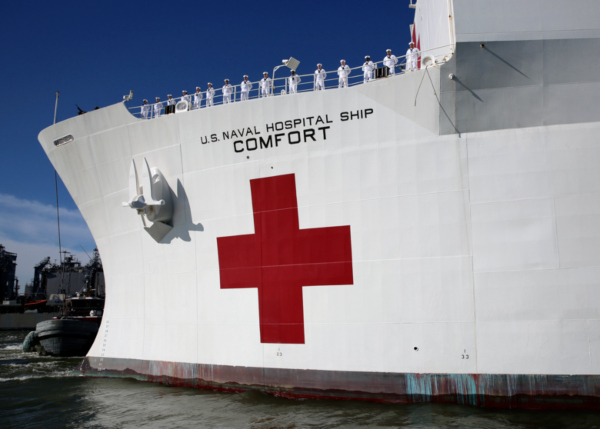
Check out the most frequently asked questions about becoming a Navy Nurse.
Speaking with a local Navy recruiter will help answer more questions about the Navy Nurse Corps program.
#7. How competitive is the Navy Nurse Candidate Program?
It is hard but not impossible to join the Navy Nurse Corps.
First, it takes a decent amount of time as you need to reserve at least four years to complete a minimum of a bachelor’s degree.
Then, you need to have the correct nurse licensing and meet other basic requirements.
You also need to take and complete the NCLEX exam.
Those that join the Navy Nurse Corps either have at least three years of professional experience or enrolled in the Nurse Candidate Program (NCP).
After you meet all the education requirements and prerequisites your career in the U.S. Navy begins with the Officer Basic Leadership Course (BOLC).
Though the Navy Nurse Corps is competitive there is enough of a demand that if you work hard and meet the basic requirements you should be able to secure a spot.
#8. What rank is a Nurse in the Navy?
A Navy Nurse is considered an Officer in the military branch.
Therefore, you start with at least the rank of O-1 and can work up the ranks, like any other sailor.
You can review the estimated monthly salary based on your Navy rank here.
#9. Do Navy Nurses go on ships?
Yes, Navy Nurses may serve aboard ships like any other military specialty.
Nurses work at stateside medical facilities as well as international locations across the globe.
The U.S. Navy currently operates more than 250 medical facilities around the globe.
Additionally, the Navy has two ships completely transformed to act as hospitals (USNS Comfort and USNS Mercy).
You may select preferences for the facilities you would like to serve yet like other Navy Officer specialties, it will get taken into consideration yet never guaranteed.
The Navy assigns Officers based on demand but you do have some say in the matter.
Related Article – ASVAB Scores For Navy Jobs
#10. Are Navy Corpsman considered Nurses?
Every branch of the military has a career track for non-licensed medical personnel.
This personnel is considered Corpsmen or medics.
On the other hand, the specialty training and roles that are more advanced are known as nursing specialties.
Therefore, the term Corpsman and Medic are interchangeable, but the specific training specialties make each service member into a Nurse.
Navy Corpsmen may serve on ships, naval hospitals, outpatient clinics, and connecting Marine Corps units.
#11. Do Navy nurses see combat?
A medic in the U.S. Navy could see combat if they are trained to fight side-by-side with combat units.
Or, they may receive focused training that takes them away from the battlefield where you focus your work more in a traditional clinical setting.
Medics that work alongside combat units receive additional training, especially if they serve with Special Forces.
The United States Navy offers demanding training programs like the Special Operations Combat Medic (SOCM) for this purpose.
Regardless, it is possible to see combat while serving as a Nurse though it’s not the norm for most medical professionals in the military.
Related Article – Navy Special Warfare Operator (SO) aka ‘Navy SEAL’: Career Profile
Conclusion
A Navy Nurse is vital to the success of the United States Armed Forces.
Nurses provide high-quality care for sailors, military families, and civilians.
No matter where you serve you’ll provide leadership and critical thinking skills to keep people healthy and safe.
- Navy Signing, Enlistment, and Reenlistment Bonuses - June 19, 2024
- Navy Health Professions Scholarship Program (HPSP) Guide - June 19, 2024
- Navy Nurse - June 19, 2024
General FAQ
How do you become a Nurse in the US Navy?
In order to become a Navy Nurse, you must meet all of the basic requirements. Once you do, you can apply to join the Navy Nurse program.
How much does a Navy Nurse make?
Navy Nurses are paid the same as their counterparts. Pay is based on length of time in service and your rank. There are some bonuses available, which vary greatly.
How difficult is it to become a Navy Nurse?
The Navy Nurse corps program is one of the most competitive in the Navy. Of the 1,000's that apply, only around 200 new nurses are accepted every year.
Do Navy Nurses serve on ships?
Yes. If you are accepted into the Nurse program, you can expect to either serve on a ship or on one of the many shore-based locations the Navy offers.
Can I choose where I want to be stationed?
The Navy does allow you to fill out a 'dream sheet' of preferred locations. With that said, the needs of the Navy trump everything else.
Originally posted on April 24, 2020 @ 3:43 pm
Affiliate Disclosure: This post may contain affiliate links. If you click and purchase, I may receive a small commission at no extra cost to you. I only recommend products I have personally vetted. Learn more.
